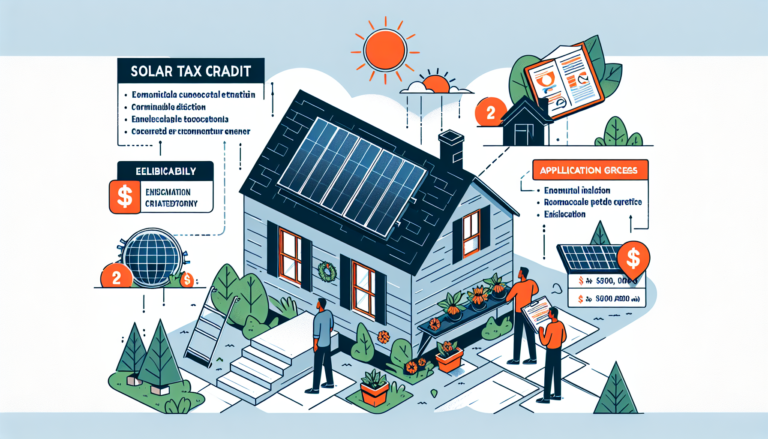Get ready to save big on solar energy in Massachusetts! With the state’s generous solar incentives, homeowners can take advantage of the Residential Renewable Energy Income Tax Credit and enjoy significant savings on their energy bills. In this comprehensive guide for 2023, you’ll find all the information you need to make the most of Massachusetts’ solar incentives and take a step towards a greener and more cost-effective future. So, whether you’re looking to go green or simply want to cut down on your electricity expenses, this article will provide you with the essential details on how to harness the power of the sun in the Bay State.
Residential Renewable Energy Income Tax Credit
1.1 Eligibility criteria
To be eligible for the Residential Renewable Energy Income Tax Credit in Massachusetts, you must meet certain criteria. Firstly, you must be a resident of Massachusetts and own a residential property. The property must be your primary place of residence, and it must be equipped with eligible renewable energy systems. Examples of eligible systems include solar panels, wind turbines, and geothermal systems. Additionally, the renewable energy system must be new and not previously installed at the property.
1.2 How to apply
To apply for the Residential Renewable Energy Income Tax Credit, you will need to complete and submit the necessary forms to the Massachusetts Department of Revenue. The specific forms may vary depending on the tax year. It is important to carefully follow the instructions provided by the department and include all required documentation. Keep in mind that the application must be submitted within the designated timeframe, typically before the tax filing deadline.

1.3 Maximum credit amount
The maximum credit amount available through the Residential Renewable Energy Income Tax Credit is $1,000. This credit is non-refundable, which means it can only be used to offset your state tax liability. If your tax liability is less than $1,000, the credit will be limited to the amount owed.
1.4 Other important details
It is important to note that the Residential Renewable Energy Income Tax Credit is a state-level incentive and may be subject to change. As such, it is recommended to regularly check for updates and consult with a tax professional for the most accurate and up-to-date information. Additionally, the credit may not be available in future tax years if the program is not renewed or extended by the state government.
Solar Massachusetts Renewable Target (SMART) Program

2.1 Program overview
The Solar Massachusetts Renewable Target (SMART) Program is a statewide initiative aimed at encouraging the development of solar energy projects in Massachusetts. The program provides incentives for the installation of solar photovoltaic (PV) systems, which convert sunlight into electricity. By incentivizing solar energy generation, the SMART Program aims to increase the state’s renewable energy capacity and reduce greenhouse gas emissions.
2.2 Eligibility requirements
To be eligible for the SMART Program, the solar PV system must meet certain criteria. The system must have a capacity of 25 kilowatts (kW) or greater, and it must be interconnected with the distribution system of a participating utility company. Additionally, the system must comply with all applicable building, electrical, and safety codes. Eligible participants include homeowners, businesses, and non-profit organizations.

2.3 Incentives offered
Under the SMART Program, participants receive financial incentives based on the amount of solar energy generated by their PV system. The incentives are structured as long-term contracts, known as SMART tariff contracts, with participating utility companies. The contracts provide fixed, tiered payments for each kilowatt-hour (kWh) of solar energy produced. The specific payment rates vary depending on the size and location of the system.
2.4 Application process
To participate in the SMART Program, interested individuals or organizations must submit an application to the Massachusetts Department of Energy Resources (DOER). The application requires detailed information about the proposed solar PV system, including its capacity, location, and expected energy production. Additionally, participants must enter into a net metering agreement with their utility company to facilitate the integration of the solar energy into the electrical grid.
Solar Investment Tax Credit (ITC)
3.1 Overview of the ITC
The Solar Investment Tax Credit (ITC) is a federal tax incentive designed to promote the adoption of solar energy systems. Through the ITC, individuals and businesses can claim a credit on their federal income taxes for a percentage of the cost of installing eligible solar energy systems. The ITC has been a significant driver of solar energy growth in the United States, including in Massachusetts.
3.2 Qualification criteria
To qualify for the Solar Investment Tax Credit, the solar energy system must meet certain criteria set by the federal government. The system must be located in the United States and used primarily for generating electricity. It must also be new and capable of meeting applicable performance and quality standards. Furthermore, the property on which the system is installed must be owned by the taxpayer claiming the credit.
3.3 Claiming the tax credit
To claim the Solar Investment Tax Credit, eligible taxpayers must complete and submit IRS Form 5695 along with their federal income tax return. The form requires information about the solar energy system, including the installation date, cost, and other relevant details. It is important to retain all documentation related to the solar energy system, such as receipts and invoices, as the IRS may request them for verification purposes.
3.4 Impact of the recent federal changes
It is worth noting that the Solar Investment Tax Credit has undergone changes in recent years. As of 2023, the federal tax credit for residential solar energy systems has been reduced to 26% of the installation cost. However, the tax credit for commercial solar energy systems remains at 30%. These percentages are subject to change in future years, so it is advisable to stay informed about any updates or modifications to the program.
Net Metering
4.1 Definition and purpose
Net metering is a billing arrangement that allows solar energy system owners to receive credit for the excess electricity they generate and feed back into the grid. Under net metering, the electricity meter measures the difference between the electricity consumed from the grid and the electricity generated by the solar energy system. The purpose of net metering is to support the integration of renewable energy sources, such as solar, into the existing electrical grid infrastructure.
4.2 How net metering works
When a solar energy system generates excess electricity, it is typically fed into the electrical grid. The electricity meter records this surplus and provides credit to the system owner. On days when the solar energy system does not produce enough electricity to meet the demand, the system owner can draw electricity from the grid and consume it without incurring additional charges.
4.3 Eligibility requirements
Eligibility for net metering in Massachusetts varies depending on the type of solar energy system and the size of the installation. In general, residential and small commercial systems with a capacity of 10 kilowatts (kW) or less are eligible for net metering. Larger commercial and industrial systems may also be eligible, but they must comply with additional regulations and requirements set by the Massachusetts Department of Public Utilities.
4.4 Benefits and limitations
Net metering offers several benefits to solar energy system owners. It allows them to offset their electricity bills by exporting excess energy to the grid, effectively reducing their overall energy costs. Additionally, net metering can provide a financial incentive for investing in solar energy systems, as owners can earn credits or receive compensation for the excess electricity they generate. However, it is important to note that net metering policies vary by state and utility company, and certain limitations and restrictions may apply.

